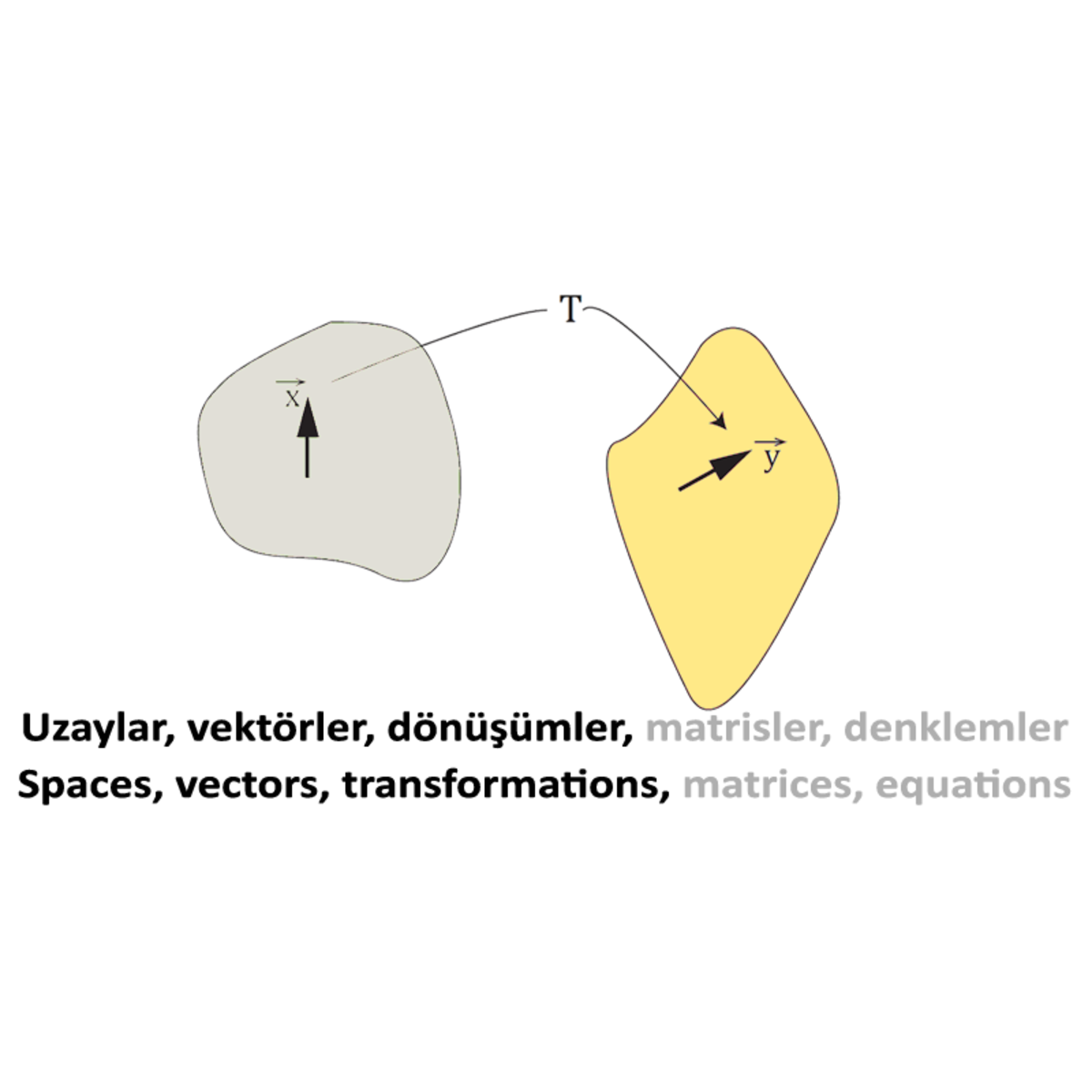
Bu ders doğrusal cebir ikili dizinin birincisidir. Doğrusal uzaylar kavramı, doğrusal işlemciler, matris gösterimleri ve denklem sistemlerinin hesaplanabilmesi için temel araçlar vb. konuları içermektedir. Ders gerçek yaşamdan gelen uygulamaları da tanıtmaya önem veren “içerikli yaklaşımla” tasarlanmıştır.
Bölümler:
Bölüm 1: Doğrusal Cebirin Matematikdeki Yeri ve Kapsamı
Bölüm 2: Düzlemdeki Vektörlerin Öğrettikleri
Bölüm 3: İki Bilinmeyenli Denklemlerin Öğrettikleri
Bölüm 4: Doğrusal Uzaylar
Bölüm 5: Fonksiyon Uzayları ve Fourier Serileri
Read more
Bu ders doğrusal cebir ikili dizinin birincisidir. Doğrusal uzaylar kavramı, doğrusal işlemciler, matris gösterimleri ve denklem sistemlerinin hesaplanabilmesi için temel araçlar vb. konuları içermektedir. Ders gerçek yaşamdan gelen uygulamaları da tanıtmaya önem veren “içerikli yaklaşımla” tasarlanmıştır.
Bölümler:
Bölüm 1: Doğrusal Cebirin Matematikdeki Yeri ve Kapsamı
Bölüm 2: Düzlemdeki Vektörlerin Öğrettikleri
Bölüm 3: İki Bilinmeyenli Denklemlerin Öğrettikleri
Bölüm 4: Doğrusal Uzaylar
Bölüm 5: Fonksiyon Uzayları ve Fourier Serileri
Bu ders doğrusal cebir ikili dizinin birincisidir. Doğrusal uzaylar kavramı, doğrusal işlemciler, matris gösterimleri ve denklem sistemlerinin hesaplanabilmesi için temel araçlar vb. konuları içermektedir. Ders gerçek yaşamdan gelen uygulamaları da tanıtmaya önem veren “içerikli yaklaşımla” tasarlanmıştır.
Bölümler:
Bölüm 1: Doğrusal Cebirin Matematikdeki Yeri ve Kapsamı
Bölüm 2: Düzlemdeki Vektörlerin Öğrettikleri
Bölüm 3: İki Bilinmeyenli Denklemlerin Öğrettikleri
Bölüm 4: Doğrusal Uzaylar
Bölüm 5: Fonksiyon Uzayları ve Fourier Serileri
Bölüm 6: Doğrusal İşlemciler ve Dönüşümler
Bölüm 7: Doğrusal İşlemcilerden Matrislere Geçiş
Bölüm 8: Matris İşlemleri
-----------
This is the first of the sequence of two courses. It develops the fundamental concepts in linear spaces, linear operators, matrix representations and basic tools for calculations with systems of equations. The course is designed with a “content based” emphasis, answering the “why” and “where“ of the topics, as much as the traditional “what” and “how” leading to “definitions” and “proofs”.
Chapters:
Chapter 1: Place and Contents of Linear Algebra Cebirin
Chapter 2: Learning From Vectors in the Plane
Chapter 3: Learning From Equations For Two Unknowns
Chapter 4: Linear Spaces
Chapter 5: Function Spaces and Fourier Series
Chapter 6: Linear Operators and Transformations
Chapter 7: From Linear Operators to Matrices
Chapter 8: Matrix Operations
-----------
Kaynak: Attila Aşkar, “Doğrusal cebir”. Bu kitap dört ciltlik dizinin üçüncü cildidir. Dizinin diğer kitapları Cilt 1 “Tek değişkenli fonksiyonlarda türev ve entegral”, Cilt 2: "Çok değişkenli fonksiyonlarda türev ve entegral" ve Cilt 4: “Diferansiyel denklemler” dir.
Source: Attila Aşkar, Linear Algebra, Volume 3 of the set of Vol1: Calculus of Single Variable Functions, Volume 2: Calculus of Multivariable Functions and Volume 4: Differential Equations.
What's inside
Syllabus
Doğrusal Cebirin Matematikdeki Yeri ve Kapsamı / Place and Contents of Linear Algebra
Düzlemdeki Vektörlerin Öğrettikleri / Learning From Vectors in the Plane
Read more
Syllabus
Good to know
Save this course
Reviews summary
Linear algebra concepts and applications
Activities
Diğer öğrencilerle doğrusal cebir çalışın
Show steps
Doğrusal cebir kavramlarını diğer öğrencilerle tartışmanıza yardımcı olacaktır ve bu da anlayışınızı geliştirecektir.
Show steps
-
Bir çalışma grubu oluşturun
-
Doğrusal cebir problemlerini birlikte çözün
-
Kavramsal soruları tartışın
Doğrusal cebir kavramlarını açıklayın
Show steps
Doğrusal cebir kavramlarını daha derinlemesine anlamanıza yardımcı olacaktır ve bilgilerinizi pekiştirmenize yardımcı olacaktır.
Show steps
-
Doğrusal uzayların tanımını açıklayın
-
Doğrusal dönüşümlerin özelliklerini açıklayın
-
Doğrusal cebirin uygulamalarını tartışın
Diğer öğrencilere doğrusal cebir öğretin
Show steps
Doğrusal cebir kavramlarını anlamanıza ve bilginizi pekiştirmenize yardımcı olacaktır.
Show steps
-
Doğrusal cebirde yeteneklerinizi geliştirin
-
Diğer öğrencilere ders verin
-
Konuları açık bir şekilde iletin
Show all three activities
Diğer öğrencilerle doğrusal cebir çalışın
Show steps
Doğrusal cebir kavramlarını diğer öğrencilerle tartışmanıza yardımcı olacaktır ve bu da anlayışınızı geliştirecektir.
Show steps
- Bir çalışma grubu oluşturun
- Doğrusal cebir problemlerini birlikte çözün
- Kavramsal soruları tartışın
Doğrusal cebir kavramlarını açıklayın
Show steps
Doğrusal cebir kavramlarını daha derinlemesine anlamanıza yardımcı olacaktır ve bilgilerinizi pekiştirmenize yardımcı olacaktır.
Show steps
- Doğrusal uzayların tanımını açıklayın
- Doğrusal dönüşümlerin özelliklerini açıklayın
- Doğrusal cebirin uygulamalarını tartışın
Diğer öğrencilere doğrusal cebir öğretin
Show steps
Doğrusal cebir kavramlarını anlamanıza ve bilginizi pekiştirmenize yardımcı olacaktır.
Show steps
- Doğrusal cebirde yeteneklerinizi geliştirin
- Diğer öğrencilere ders verin
- Konuları açık bir şekilde iletin
Career center
Linear Algebra Teacher
Investment Analyst
Data Scientist
Operations Research Analyst
Financial Analyst
Quantitative Analyst
Market Researcher
Software Engineer
Actuary
Economist
Operations Manager
Statistician
Computer Scientist
Financial Risk Manager
Data Analyst
Reading list
Share
Similar courses
OpenCourser helps millions of learners each year. People visit us to learn workspace skills, ace their exams, and nurture their curiosity.
Our extensive catalog contains over 50,000 courses and twice as many books. Browse by search, by topic, or even by career interests. We'll match you to the right resources quickly.
Find this site helpful? Tell a friend about us.
We're supported by our community of learners. When you purchase or subscribe to courses and programs or purchase books, we may earn a commission from our partners.
Your purchases help us maintain our catalog and keep our servers humming without ads.
Thank you for supporting OpenCourser.



